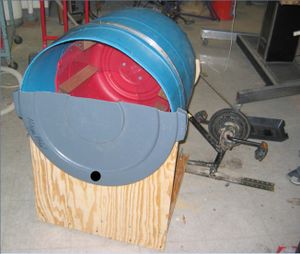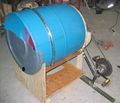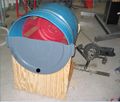Washing Machines: Difference between revisions
From
No edit summary |
No edit summary |
||
| Line 4: | Line 4: | ||
|date = 2021 | |date = 2021 | ||
|tools = [[Wrenches]] | |tools = [[Wrenches]] | ||
|parts = [[Frames]], [[Nuts]], [[Bolts]], [[Plates]], [[End caps]], [[Barrels]] | |parts = [[Frames]], [[Nuts]], [[Bolts]], [[Plates]], [[End caps]], [[Barrels]], [[Bicycle bottom brackets]] | ||
|techniques = [[Shelf joints]], [[Tri joints]] | |techniques = [[Shelf joints]], [[Tri joints]] | ||
|stl = | |stl = | ||
| Line 29: | Line 29: | ||
Washer3.jpg|Washer inside | Washer3.jpg|Washer inside | ||
</gallery> | </gallery> | ||
==Bottom bracket== | ==Bottom bracket== | ||
Revision as of 17:53, 28 March 2021
Project: Washing Machines
| Tools: | Wrenches |
|---|---|
| Parts: | Frames, Nuts, Bolts, Plates, End caps, Barrels, Bicycle bottom brackets |
| Techniques: | Shelf joints, Tri joints |
Challenges
Many people worldwide wash clothes manually, but the detergents are chemically harmful, and the repetitive motion of scrubbing is straining to the muscles and joints.
Approaches
Build a washing machine based on this inexpensive and durable design for use in rural areas. Use only Replimat components wherever possible. Gently wash clothes using pedal or solar electric power.
Cycle
- first fill
- second fill
- detergent release
- rinse / sanitize
- spin
Prototype
-
Washer gear assembly
-
Washer front
-
Washer inside
Bottom bracket
-
Bicycle bottom bracket adapter CAD
-
Bicycle bottom bracket adapter left side
-
Bicycle bottom bracket adapter right side
-
Cranks installed
Development targets
References
File:The Pedal-Powered Washing Machine - Jenny Hu, Radu Raduta, Jessica Vechakul, Allen Armstrong.pdf
File:Unequal Loads - The Gender Division of Laundry - Claire Kovach.pdf







